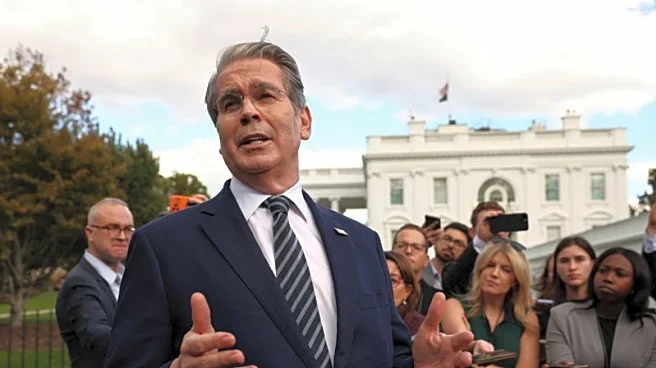By David Lawder
WASHINGTON (Reuters) -U.S. Treasury Secretary Scott Bessent on Sunday said the U.S. will not lose any taxpayer funds in financial support measures for Argentina, saying the U.S. was backing a Latin American ally as it holds a key election.
The United States earlier this month purchased Argentine pesos and finalized a $20 billion currency swap framework with Argentina's central bank after a meeting between the two countries' top finance officials in Washington.
"There will be no taxpayer
losses. This is a swap line. This is not a bailout, and it is from the Exchange Stabilization Fund, which I control at Treasury," Bessent told NBC's "Meet the Press" program. "It has never registered a loss. It is not going to register a loss."
US TREASURY HAS BOUGHT PESOS ON OPEN MARKET
Argentina on Sunday holds parliamentary mid-term elections in which libertarian President Javier Milei's party is seeking to strengthen its position and avoid roll-backs of his fiscal austerity program and private-sector reform agenda - policies that the Trump administration supports.
The Treasury has been buying Argentine pesos in the open market to support its value against the dollar, despite the views of many traders and economists that the currency is overvalued. The Treasury has disclosed few details about the swap line and the peso interventions.
BESSENT SAYS ADMINISTRATION WANTS TO SET TONE IN LATAM
The support comes from the Treasury's $211 billion Exchange Stabilization Fund, which has been used to back Federal Reserve lending facilities during crises such as the COVID-19 pandemic and the 2023 bank stability crisis. The ESF's biggest holding is International Monetary Fund reserve assets known as Special Drawing Rights.
"We are supporting a U.S. ally in Latin America and we want to set the tone in Latin America," Bessent told Meet the Press. He said the Trump administration did not want Argentina to suffer the same fate as Venezuela, which he described as a "failed narco-state."
"So we think it is much better to use American economic power up front to stabilize a friendly government and lead the way, because we've got many other governments in Latin America, Bolivia, Ecuador, Paraguay, who all want to follow," he said.
(Reporting by David Lawder; Editing by Aidan Lewis and David Holmes)
















